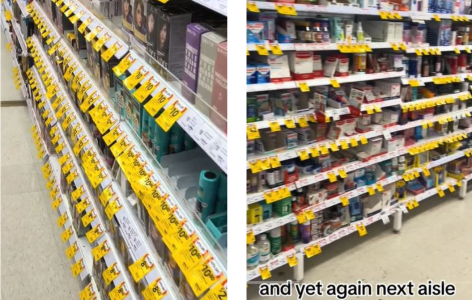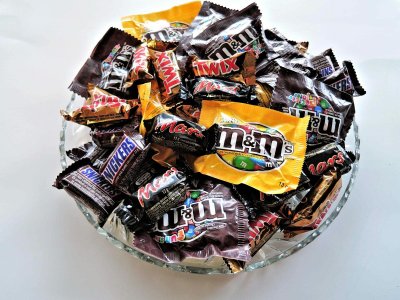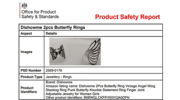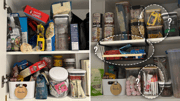Shocking study reveals Aussies ditching healthy choices for special deals
We all love a good bargain. But when it comes to the weekly grocery shop, those tempting 'specials' could be leading Australians astray.
A concerning new study has revealed that supermarket promotions dramatically boost sales of unhealthy items—while nutritious essentials are left in the dust.
The analysis by the Australian Bureau of Statistics (ABS) shows that discounted groceries fly off the shelves at up to 70 times their normal rate.
And it's often junk food flying fastest: chocolate, chips, soft drinks... the treats we know we should only enjoy occasionally seem impossible to resist with a bright yellow 'special' sticker.
For senior shoppers watching their budgets closely, the psychological pull can be even stronger.
When living on a fixed income, the fear of missing out on savings triggers impulse buying. And we all know where those snap decisions usually lead us—down the snack aisle!
Adrian Cameron, a professor of public health at Deakin University, has asserted that marketing strategies involving price promotions and prominent product placement exhibit a significant bias towards less healthy options.
‘Australians tend to do their shopping based on what’s on special,’ he said.
‘A lot of items put on price promotions are things that you can expand sales on. They call those discretionary purchases, or impulse buys—things like chips and other junk food.’
Past research, co-authored by Cameron and published in 2019, revealed that major supermarkets offer discounts on unhealthy food twice as frequently as on healthier items, and these discounts are typically twice the size.
This new research by ABS highlighted the significant impact of supermarket promotions on consumer purchases. The study stated that discounted product sales can surge by multiple factors compared to their regular levels.
Typically, consumers spend five times more on a product when discounted, but this figure can escalate even higher in certain cases.
A separate analysis of the ABS research made by The Guardian showed that consumer expenditure increased by a staggering 70-fold when a premium brand of olive oil was discounted.
The ABS data, derived from supermarket scanner figures compiled by the agency, provided valuable insights into shoppers' attraction to promoted items, a trend that becomes even more pronounced during rising living costs.
'We are manipulated by these tactics because our behaviour is driven by our pre-existing goals,' said Jana Bowden, a professor of marketing at Macquarie University.
'If our goal is to save money, then seeing a deal makes us feel good, and that, in turn, operates as a reward signal. It’s a domino effect.'
The consequences for health can be dire. A poor diet is linked to obesity, heart disease, stroke, diabetes and even dementia.
As people age, nutrition becomes more important for staying active and independent.
Yet Australia has limited regulations around junk food marketing compared to other countries. Supermarkets discount unhealthy choices twice as often, coaxing shoppers to load up on high-fat, high-salt products.
Woolworths, Australia's largest supermarket chain, slightly leading Coles, collectively commands about two-thirds of the market, reaching 90 per cent in certain less competitive areas.
Promotions are typically funded through agreements between supermarkets and food manufacturers, with multinational companies specialising in less healthy items holding the largest marketing budgets.
The upcoming parliamentary inquiry, slated to commence public hearings early this year, is set to scrutinise these promotional activities.
This presents policymakers with an opportunity to address junk food marketing, as current regulations in Australia lag behind those implemented in comparable markets, as noted by Cameron.
But shoppers might not need to wait long—at least, going by supermarkets’ pronouncements.
A spokesperson from Woolworths confirmed the implementation of changes aimed at removing children's confectionery from the end of checkouts and aisles.
‘While the aisle ends still feature "sometimes foods" and treats such as chips that are on special, customers will also see a similar snacking option with a 3.5 health star rating or above on display on a shelf on each promotional end so that they can make healthier choices,’ they said.
On the other hand, a representative from Coles stated that the supermarket is dedicated to assisting customers in making healthy choices.
‘Our weekly catalogue also includes some of the thousands of specials we are currently offering, including specials on healthy back-to-school snacks,’ they assured.

What’s your take on this story, members? Share your thoughts in the comments below!
A concerning new study has revealed that supermarket promotions dramatically boost sales of unhealthy items—while nutritious essentials are left in the dust.
The analysis by the Australian Bureau of Statistics (ABS) shows that discounted groceries fly off the shelves at up to 70 times their normal rate.
And it's often junk food flying fastest: chocolate, chips, soft drinks... the treats we know we should only enjoy occasionally seem impossible to resist with a bright yellow 'special' sticker.
For senior shoppers watching their budgets closely, the psychological pull can be even stronger.
When living on a fixed income, the fear of missing out on savings triggers impulse buying. And we all know where those snap decisions usually lead us—down the snack aisle!
Adrian Cameron, a professor of public health at Deakin University, has asserted that marketing strategies involving price promotions and prominent product placement exhibit a significant bias towards less healthy options.
‘Australians tend to do their shopping based on what’s on special,’ he said.
‘A lot of items put on price promotions are things that you can expand sales on. They call those discretionary purchases, or impulse buys—things like chips and other junk food.’
Past research, co-authored by Cameron and published in 2019, revealed that major supermarkets offer discounts on unhealthy food twice as frequently as on healthier items, and these discounts are typically twice the size.
This new research by ABS highlighted the significant impact of supermarket promotions on consumer purchases. The study stated that discounted product sales can surge by multiple factors compared to their regular levels.
Typically, consumers spend five times more on a product when discounted, but this figure can escalate even higher in certain cases.
A separate analysis of the ABS research made by The Guardian showed that consumer expenditure increased by a staggering 70-fold when a premium brand of olive oil was discounted.
The ABS data, derived from supermarket scanner figures compiled by the agency, provided valuable insights into shoppers' attraction to promoted items, a trend that becomes even more pronounced during rising living costs.
'We are manipulated by these tactics because our behaviour is driven by our pre-existing goals,' said Jana Bowden, a professor of marketing at Macquarie University.
'If our goal is to save money, then seeing a deal makes us feel good, and that, in turn, operates as a reward signal. It’s a domino effect.'
The consequences for health can be dire. A poor diet is linked to obesity, heart disease, stroke, diabetes and even dementia.
As people age, nutrition becomes more important for staying active and independent.
Yet Australia has limited regulations around junk food marketing compared to other countries. Supermarkets discount unhealthy choices twice as often, coaxing shoppers to load up on high-fat, high-salt products.
Woolworths, Australia's largest supermarket chain, slightly leading Coles, collectively commands about two-thirds of the market, reaching 90 per cent in certain less competitive areas.
Promotions are typically funded through agreements between supermarkets and food manufacturers, with multinational companies specialising in less healthy items holding the largest marketing budgets.
The upcoming parliamentary inquiry, slated to commence public hearings early this year, is set to scrutinise these promotional activities.
This presents policymakers with an opportunity to address junk food marketing, as current regulations in Australia lag behind those implemented in comparable markets, as noted by Cameron.
But shoppers might not need to wait long—at least, going by supermarkets’ pronouncements.
A spokesperson from Woolworths confirmed the implementation of changes aimed at removing children's confectionery from the end of checkouts and aisles.
‘While the aisle ends still feature "sometimes foods" and treats such as chips that are on special, customers will also see a similar snacking option with a 3.5 health star rating or above on display on a shelf on each promotional end so that they can make healthier choices,’ they said.
On the other hand, a representative from Coles stated that the supermarket is dedicated to assisting customers in making healthy choices.
‘Our weekly catalogue also includes some of the thousands of specials we are currently offering, including specials on healthy back-to-school snacks,’ they assured.
Key Takeaways
- Supermarket promotions can significantly increase the sale of items, with discounts sometimes leading to a 70-fold increase in expenditure on products like premium olive oil.
- Evidence has suggested that major supermarkets discount unhealthy food items more frequently and heavily than healthier options, which impacts consumer purchasing decisions.
- An upcoming parliamentary inquiry and concerns from the competition regulator are set to scrutinise supermarket pricing practices and the fairness of promotional strategies
- Woolworths and Coles have reaffirmed their commitments to assisting consumers in making healthy choices.
What’s your take on this story, members? Share your thoughts in the comments below!
Last edited by a moderator:









